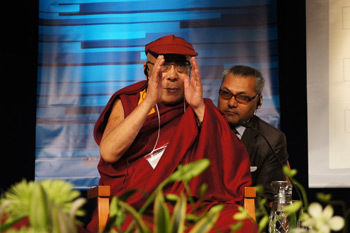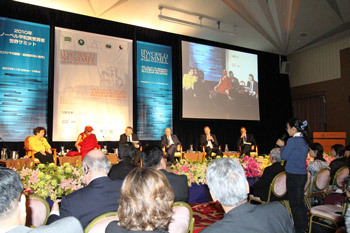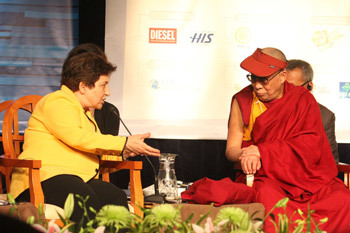Hiroshima, Japan, 13 November 2010 - His Holiness began his seventh full day in Japan by holding a 30-minute interview with Time.com, largely concerned with his thoughts regarding China, the future of the Tibetan situation, the recent awarding of the Nobel Prize to Liu Xiaobo. Then, proceeding upstairs to a spacious, open conference room overlooking the water far below, he conducted a long, exclusive interview with the Japanese monthly magazine Katei-Gaho, occasionally looking under the half-closed blinds at the fishermen lining the dock in the blue-grey morning, 22 floors beneath him.

|
| His Holiness the Dalai Lama speaking during the second day of the 11th World Summit of Nobel Laureates on November 13th, 2010. Photo/OHHDL |
In answer to searchingly direct and human questions, he outlined his definition of happiness, his views on kindness, and on how to deal with problems, stressing always how he drew his conclusions from "biological factors, not from religious teachings." Then, addressing the lack of guidance sometimes afflicting the modern world, he talked with thoughtfulness and vigor about the growth of science and technology over the last two centuries, which have brought us so much in the way of comfort and long life. But the fact remains, he stressed, that material things have no feelings. "A diamond ring is high-priced--maybe $100,000--but it has no ability to show us affection. Yet even one small cat--price, five dollars--or a little dirty puppy can take care of us. We are living beings; we need affection."
As the questions continued, His Holiness talked about caring for the old, about our fear of death, about the sometimes fraying state of the family, not just in Japan but in many places. Then he headed downstairs for the 11th Nobel Peace Laureates' Summit, and a panel he was due to sit on concerning "The Consequences of Nuclear Weapons." Beside him sat the Governor of Hiroshima, and three representatives from medical organizations, able to describe in horrifying detail the human results of nuclear attacks, now and in the future (in Hiroshima, in 1945, 140,000 of the 300,000 residents died within five months of the attack).

|
A young student asks a question during the second day of the 11th World Summit of Nobel Laureates on November 13th, 2010. Photo/Taikan Usui
|
Reflecting again on how the people of Hiroshima and Nagasaki, having suffered such horors, "should build more determination to eliminate nuclear weapons," and had in fact had already begun to do so, His Holiness described how "sometimes unfortunate things can lead to positive energy." He even remembered how, as a ten year-old ruler in Lhasa, in 1945, he received a newsreel showing the mushroom clouds rising above Hiroshima and Nagasaki, and vividly recalled the English-speaking Tibetan official who was running the projector shouting, `Oh, nuclear weapons!"
"War," he said, "I consider legalized violence. We should change our mental attitude. Not by religious teachings, but through education. Using our common sense, better awareness."
In the final session of the day, two hours later, His Holiness was the first of the five panelists invited to speak, on "The Legal, Ethical and Economical Implications of Nuclear Weapons." Flanked by Dr. Shirin Ebadi and President F.W. de Klerk, he talked about the importance of democratic institutions, such as rule of law and a free press. Later, when the floor was opened to students to ask questions, one young Japanese woman remembered her time working with Mother Teresa in Calcutta, and asked His Holiness how he maintained such a spirit of forgiveness.

|
His Holiness the Dalai Lama and Shirin Ebadi during the second day of the 11th World Summit of Nobel Laureates on November 13th, 2010. Photo/Taikan Usui
|
"We deliberately try to keep our compassion towards those hard-line Chinese officials who are making the decision on the spot to kill or imprison," he explained. "We deliberately keep these people in our imagination; we deliberately try to feel special compassion for dictators, because there is a reason to feel even more concern for their state of mind, sometimes, than for those of their victims." In the Buddhist way of thinking, after all, there is a law of causality. So an oppressor is setting into motion a "karmic chain" that may bring a lot of problems in the future; a victim may be concluding the karmic consequences of some "previous bad happening, So there may be no need for him to worry more."
As President de Klerk wrapped up the conference, he stressed how "we have learned in South Africa that implacable enemies can sit around the table, and, once you put yourself in a position to understand the feelings and motivations of the other side, you can begin to build trust." Echoing His Holiness once again, President de Klerk said, "This will be the age, the century of private diplomacy."
Many of the Nobel laureates in attendance then sat behind closed doors in a conference room to formulate a statement strongly expressing the need for a complete elimination of nuclear weapons. Finally, amidst a great and general sense of stimulation and excitement, the summit ended as the sun set over the sea.















